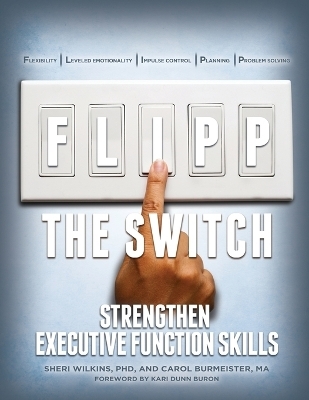
FLIPP the Switch
Autism Asperger Publishing Co,US (Verlag)
978-1-942197-01-0 (ISBN)
FLIPP the Switch: Strengthen Executive Function Skills is a practical book written for parents and educators by parents and educators. The target audience is anyone who works with young people aged 3-22 who are disorganized, inflexible, impulsive, and who struggle with planning or problem solving. Readers will learn about executive function (EF) and how EF skills contribute to success in school, at home, and in work environments. Most importantly, readers will receive specific instructions, templates, and how-to scenarios for 25 strategies, five strategies for each of the five FLIPP components – flexibility, leveled emotionality, impulse control, planning, and problem solving. This book is indispensable for anyone who wants to minimize conflict, maximize on-task behaviour, and support positive social-emotional development in a child or student with challenging behaviour.
Although many educators associate deficits in EF skills with students on the autism spectrum, the reality is that many young people struggle with executive functioning. In fact, it is accurate to say that all young people are learning executive functioning as these skills are not fully developed until people are well into their twenties. In addition, several clinical conditions, such as attention deficit disorders, fetal alcohol syndrome disorder, intellectual disability, obsessive-compulsive disorders, social communication disorder, specific learning disability, Tourette’s Syndrome, and traumatic brain injury are often understood to have a component of EF deficits. Furthermore, individuals with diagnoses such as anxiety, depression, and schizophrenia may also exhibit deficits in the area of executive function.
The good news is that there are evidence-based strategies that can be used at home, in school, in the community, and in work situations that can significantly improve the executive functioning of individuals who struggle in this area. Given the right tools, parents, educators, and others who work with this population can effectively structure the environment and teach strategic thinking skills that will support the critical life skills of flexibility, leveled emotionality, impulse control, planning, and problem solving.
Sheri Wilkins, PhD, has worked in the field of education for over 30 years at the preschool, elementary, high school, and university levels. She has dedicated her professional career to serving students with disabilities and building the capacity of educators to better serve this unique population. After her son Dominic sustained a mild traumatic brain injury in a car accident in 2010, Sheri gained first-hand experience in the power of environmental modifications and metacognitive strategies to support people who struggle with executive functions. It was this personal experience that led her to work with parents of children with disabilities, specifically children who may be inflexible, emotional, impulsive, and poor at planning and problem solving. Sheri worked as part of the University of California, Riverside, USA, committee that developed a certificate program for teachers in the education of students with autism and served as a reviewer in the National Professional Development Center on Autism Disorders’ 2014 update on evidence-based practices. Carol Burmeister, MA, has served as a paraprofessional, general and special education teacher, program specialist, university instructor, and consultant in a wide variety of educational settings, which has provided her with the opportunity to work with students with unique learning challenges, including cognitive, behavioral, communication, and autism spectrum disorders. Carol has been instrumental in improving the lives of individuals with disabilities through involvement in a variety of organizations at the local, state, and national levels. With Sheri Wilkins, she worked as part of the University of California, Riverside, USA, committee that developed a certificate program for teachers in the education of students with autism and served as a reviewer in the National Professional Development Center on Autism Disorders’ 2014 update on evidence-based practices.
| Erscheint lt. Verlag | 30.5.2015 |
|---|---|
| Vorwort | Kari Dunn Buron |
| Sprache | englisch |
| Maße | 152 x 229 mm |
| Gewicht | 455 g |
| Themenwelt | Sachbuch/Ratgeber ► Gesundheit / Leben / Psychologie ► Krankheiten / Heilverfahren |
| Sozialwissenschaften ► Pädagogik ► Sonder-, Heil- und Förderpädagogik | |
| ISBN-10 | 1-942197-01-2 / 1942197012 |
| ISBN-13 | 978-1-942197-01-0 / 9781942197010 |
| Zustand | Neuware |
| Haben Sie eine Frage zum Produkt? |
aus dem Bereich


